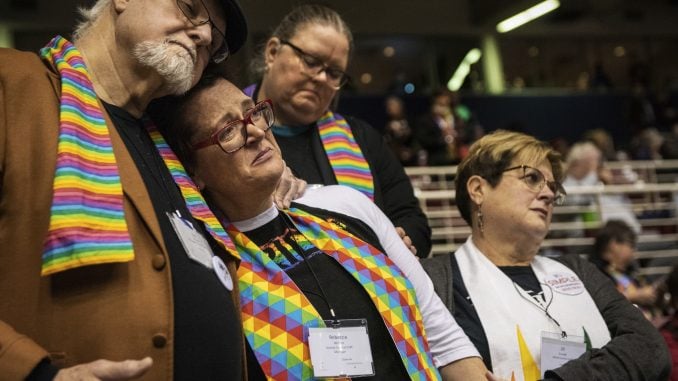
DURHAM — Last week a global conference of delegates from the United Methodist Church met in a called special session to determine the denomination’s path forward on gay marriage and clergy after recent years of increasing pressure from inside and outside the church. The “Traditional Plan” was passed after a tense two-day discussion among the 800-plus delegates in St. Louis, solidifying 1972 language from the Methodist Book of Discipline excluding practicing homosexuals from ministry and forbidding same-sex marriage ceremonies. North Carolina churches and schools on both sides of the issue are now left to discuss what the decision means for their communities.
The result was a shock to supporters of the “One Church Plan,” which was overwhelmingly supported by bishops in the United States. That plan would have struck language from the Book of Discipline that says, “The practice of homosexuality is incompatible with Christian teaching,” and would have opened ministry and marriage in the church to LGBTQ Methodists, leaving the final say up to individual congregations.
After many years of debate and disagreement in the church, the Council of Bishops requested this special session to find “a way forward beyond the impasse around LGBTQ identity, interpretation of scripture and the unity of the church.”
Proponents of the One Church Plan say because it doesn’t force clergy to perform same-sex marriages, it is a way to end the decades-long debate and allow people of different views to live according to their conscience. Those opposed, mostly backers of the Traditional Plan, believe removing definitions associated with traditional marriage and sexuality, and leaving it up to local bishops, priests and lay people to fill in the details, is a recipe for chaos and confusion.
In St. Louis, the main organized resistance to changing the Book of Discipline came from delegates from the developing world, especially those from Africa. Dr. Jerry P. Kulah, Dean of Gbarnga School of Theology, United Methodist University in Liberia, coordinated the Africa Initiative, a major force of delegates at the conference. Frustration ran high on the traditional side about “theological colonialism” and the perception that American leaders were looking down on their fellow African believers.
“…We know of no compelling arguments for forsaking our church’s understanding of scripture and the teachings of the church universal,” Kulah said in a speech on the issue. “And then please hear me when I say as graciously as I can: we Africans are not children in need of Western enlightenment when it comes to the church’s sexual ethics. We do not need to hear a progressive U.S. bishop lecture us about our need to ‘grow up.’”
Bishop Hope Morgan Ward, who represents the North Carolina Conference of the United Methodist Church, released a statement after the conference that was neutral enough to avoid upsetting either camp.
“The Session was tumultuous, demonstrating the difficult intersections of Biblical interpretation, contextual ministry and the global nature of our church,” the bishop’s statement read. “The Traditional Plan was affirmed by 53% of General Conference delegates with strong support from conservative regions of the global church. It will take some time to accurately share all the implications of the actions of the General Conference.”
In a video the conference shared on Facebook, Bishop Hope Morgan Ward added, “Many of us are deeply disappointed; many of us are pleased. Because many of us identify with the 47 percent, and many of us agree and identify with the 53 percent. But like any family, we can love each other across those differences. We do that really well in North Carolina.”
The National Association of Schools and Colleges of the United Methodist Church (NASCUMC), which represents 93 institutions of higher learning, including North Carolina-based schools like Duke University, High Point University, Pfeiffer University, Brevard College, Greensboro College and others, released a unanimous statement in January calling “upon the leaders of the United Methodist Church at this 2019 Called General Conference to honor the past and current practices of inclusion by amending their policies and practices to affirm full inclusion in the life and ministry of the United Methodist Church of all persons regardless of their race, ethnicity, creed, national origin, gender, gender identity/expression or sexual orientation.
Mary McClintock Fulkerson is a professor at Duke Divinity School and the faculty sponsor of “Sacred Worth,” an LGBTQ group for divinity students on campus. After Duke and other Methodist-affiliated schools were rebuffed, the group gathered that Friday for an event described as, “a time of solidarity and support in the wake of the proceedings of the UMC General Conference earlier this week.”
Fulkerson told North State Journal, “Simply appealing to what scripture says is simplistic because you have to have an account of what God’s redemptive presence in the world looks like… And a simple way of putting it is, God’s presence is loving the neighbor, which is what Jesus called us to do. And that’s the kind of criteria that allows us to selectively interpret scripture.”
Fulkerson had concern about what “enforcement” of the Traditional Plan on Methodist institutions could look like. Not being a United Methodist herself, Fulkerson did not want to weigh in on whether the university would choose to remain affiliated with the church.
At nearby Duke Memorial United Methodist Church in downtown Durham, which is not affiliated with the university, one of many district meetings met across the North Carolina Conference on Sunday. One attendee told NSJ emotions ran high and supporters of LGBTQ inclusion displayed the rainbow flag in opposition to the decision.
Official exit procedures were made in St. Louis for churches who may wish to leave the denomination in order to make transfer of property and other details simplified. Discussions at the district meetings in part discussed this potential, but it is unclear how many North Carolina churches or schools would consider officially splitting from the United Methodist Church.



